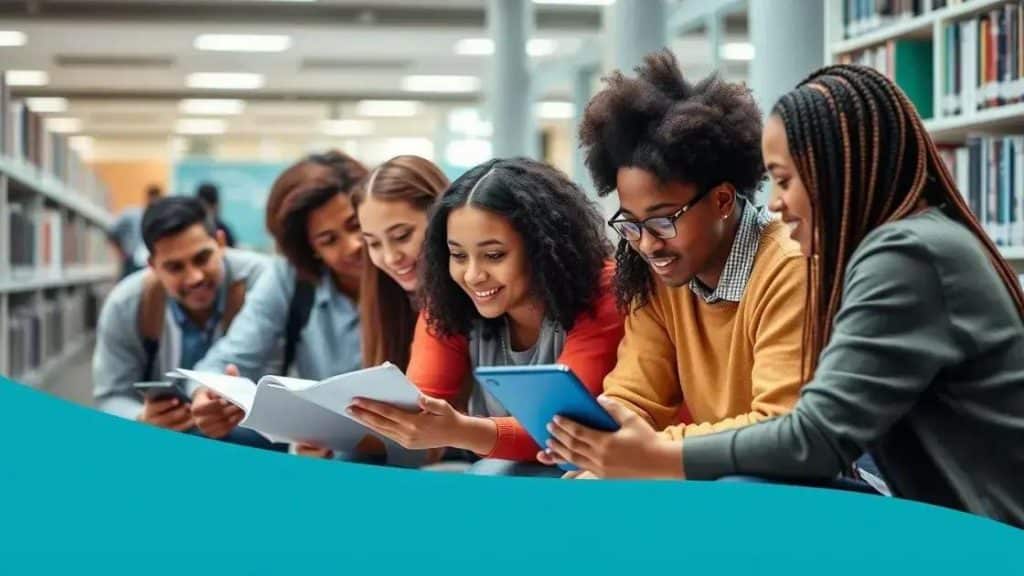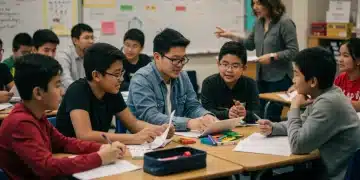Recent patterns in academic success 2025 forecast

Future academic success strategies will focus on personalized learning, skill development, and social-emotional learning, effectively preparing students for real-world challenges while enhancing their overall educational experience.
Recent patterns in academic success highlight significant changes shaping education for 2025. Have you ever wondered how these trends might affect students’ experiences and outcomes? Let’s dive into what’s emerging in the educational landscape.
Understanding current trends in academic achievement
Understanding current trends in academic achievement is essential for educators and students alike. By analyzing these trends, we can gain insights into what drives success in academic settings.
Current Influences on Academic Success
Several factors contribute to academic performance today. These influences shape how students learn, engage, and excel in their studies. Notably, the rise of technology has transformed educational environments, providing new tools for learning.
- Access to digital resources
- Interactive learning platforms
- Online collaboration tools
- Personalized learning experiences
Moreover, social dynamics play a critical role in shaping student success. Peer interactions and support systems can significantly impact motivation and achievement. Creating a positive learning community enhances students’ overall academic experiences.
Engagement and Motivation
The level of student engagement is another crucial element affecting academic success. Engaged students are more likely to perform better academically. Encouraging participation through varied teaching methods can increase interest in learning.
- Project-based learning
- Group discussions
- Hands-on activities
- Real-world applications
As the educational landscape continues to evolve, understanding these trends will help educators adapt their strategies to foster better outcomes. By staying informed, schools can prepare students for future challenges and equip them with the skills needed for success.
In summary, recognizing the elements influencing current academic trends enables educators to better support their students. Through the integration of technology, social engagement, and innovative teaching methods, we can create an environment where all students thrive and achieve their best.
Key factors influencing academic success in 2025
Key factors influencing academic success in 2025 are evolving as educational landscapes adapt to new demands. Recognizing these factors will aid both students and educators in navigating challenges ahead.
Technological Advancements
Technology now plays a significant role in education. The integration of advanced tools can enhance learning experiences and accessibility. For instance, students benefit from access to online resources and learning management systems.
- Artificial intelligence for personalized learning
- Virtual reality for immersive experiences
- Online collaboration platforms
- Adaptive learning technologies
Such tools not only support varied learning styles but also foster engagement among students, leading to improved academic outcomes.
Socioeconomic Factors
Socioeconomic status also significantly impacts educational achievement. Families with greater resources can provide enhanced academic support, including tutoring and extracurricular activities. This reality creates disparities in the opportunities available to students.
- Access to educational materials
- Participation in enrichment programs
- Support from parents
- Connections to professional networks
These differences highlight the necessity for schools to address equity in education. Programs aimed at providing additional resources to underprivileged students can help bridge the gap.
Student Wellness
Another critical factor is student wellness. Mental health and physical well-being influence learning capacity and focus. Schools are increasingly recognizing the importance of nurturing a supportive environment that promotes health.
- Mental health resources
- Healthy meal programs
- Physical education initiatives
- Counseling services
When students feel safe and supported, they are more likely to thrive academically. As such, investing in wellness programs is essential for promoting long-term success.
Understanding these key factors will prepare educators and students for the future challenges of academic achievement. By addressing technological, socioeconomic, and wellness-related factors, we can create a more equitable and effective education system.
The role of technology in learning environments

The role of technology in learning environments is becoming increasingly significant. It shapes how educators teach and how students learn. Modern classrooms are integrating various technologies that enhance engagement and accessibility.
Interactive Learning Tools
One of the most impactful advancements is the use of interactive learning tools. These tools encourage student participation and make learning more dynamic. For example, classrooms can utilize:
- Smartboards for collaborative projects
- Educational apps that provide real-time feedback
- Virtual simulations for practical learning experiences
- Online quizzes and games to reinforce concepts
Such technology allows students to take charge of their learning, foster critical thinking, and explore subjects in depth.
Access to Information
Technology also provides students with unprecedented access to information. The internet serves as a vast resource library, available at their fingertips. This accessibility leads to:
- Informed discussions in the classroom
- Opportunities for independent research
- Exposure to diverse perspectives and cultures
- Enhanced critical thinking skills through analysis and evaluation of information
The ability to easily access and evaluate different sources encourages students to become more self-directed learners.
Collaboration and Communication
In addition, technology fosters collaboration among students. Tools such as messaging apps and video conferencing enable group projects, even when students are not physically together. Collaboration helps develop teamwork skills and prepares students for future workplaces.
Furthermore, teachers can use technology to connect with parents and guardians, keeping them informed about their children’s progress. This open channel of communication enhances the educational experience and strengthens the school community.
Overall, the integration of technology in learning environments creates innovative and accessible spaces for students to thrive. As we continue to evolve, understanding the role of technology will be key to enhancing education.
How socioeconomic status impacts education outcomes
How socioeconomic status impacts education outcomes is a critical issue in today’s society. Access to resources and support heavily influences students’ academic success. Families with higher income levels often provide more educational opportunities for their children.
Access to Educational Resources
Students from wealthier families typically have better access to educational materials and resources. This includes:
- Tutoring services that help reinforce concepts
- Extracurricular activities that enhance learning
- Advanced placement courses that prepare them for college
- Access to technology, like computers and the internet
These advantages can lead to higher test scores and better overall performance in school. On the other hand, students from lower socioeconomic backgrounds may struggle without these resources.
The Role of Parental Support
Parental involvement is another crucial factor in academic success. Families with higher socioeconomic status can often provide emotional and financial support. This support can take multiple forms:
- Encouragement to pursue higher education
- Regular communication with teachers
- Participation in school events
- Assistance with homework and projects
In contrast, parents facing financial stress may have less time and energy to invest in their children’s education, which can negatively affect academic outcomes.
Community Influence
The community environment plays a significant role as well. Students in affluent neighborhoods often attend better-funded schools with more resources. These schools may provide:
- Smaller class sizes for more personalized attention
- High-quality teachers with extensive training
- State-of-the-art facilities and extracurricular programs
- Strong support networks for students
In lower socioeconomic areas, schools may lack the funding for essential programs, leading to disparities in education quality.
Thus, understanding how socioeconomic status impacts education outcomes is vital for creating equitable educational systems. By addressing these gaps, we can work towards ensuring that all students have the opportunity to succeed.
Predictions for future academic success strategies
Predictions for future academic success strategies suggest significant changes are on the horizon. As education evolves, new methods will emerge to empower students and enhance their learning experiences.
Personalized Learning Approaches
One major trend is the growth of personalized learning. Schools will likely adopt strategies tailored to individual student needs. This approach ensures that each learner progresses at their own pace, which can lead to:
- Improved engagement with course material
- Greater ownership of the learning process
- Higher retention of information
- Better outcomes for all students
As technology continues to advance, education systems will utilize data analytics to track student progress and adapt lessons accordingly.
Focus on Skills Over Grades
Another prediction involves a shift from traditional grading to skill-based assessment. This change recognizes that students possess diverse strengths and weaknesses. Future strategies may include:
- Emphasizing critical thinking and problem-solving skills
- Encouraging creativity and innovation in projects
- Offering performance-based evaluations
- Valuing collaboration over competition
By focusing on skills, educators can better prepare students for real-world challenges.
Integration of Social-Emotional Learning (SEL)
Additionally, social-emotional learning (SEL) will likely play a more prominent role in educational strategies. Recognizing that emotional well-being directly impacts academic performance, schools will increasingly incorporate SEL into the curriculum. Benefits of this integration may include:
- Better stress management techniques
- Improved interpersonal skills
- Greater resilience in facing challenges
- Enhanced motivation and focus
By equipping students with these essential skills, educators can create a more supportive learning environment.
Overall, predictions for future academic success strategies indicate a more holistic approach to education. By embracing personalized learning, focusing on skills, and integrating SEL, schools can empower students to thrive in a rapidly changing world.
In summary, the future of academic success strategies is set to evolve significantly. By embracing personalized learning, prioritizing skill development, and integrating social-emotional learning, educators can create a more effective and supportive environment for students. Recognizing the impact of socioeconomic factors and leveraging technology will further enhance these strategies, preparing students for the challenges ahead. Together, these approaches can lead to a more equitable and successful educational landscape for all learners.
FAQ – Frequently Asked Questions about Future Academic Success Strategies
What is personalized learning?
Personalized learning tailors educational experiences to meet individual student needs, allowing them to progress at their own pace.
How will skill development impact students?
Focusing on skill development prepares students for real-world challenges by enhancing critical thinking, creativity, and collaboration.
Why is social-emotional learning important?
Social-emotional learning fosters emotional well-being, helping students manage stress and build resilience, which positively affects their academic performance.
What role does technology play in education?
Technology supports personalized learning through data analytics and interactive tools, making learning more engaging and accessible.





